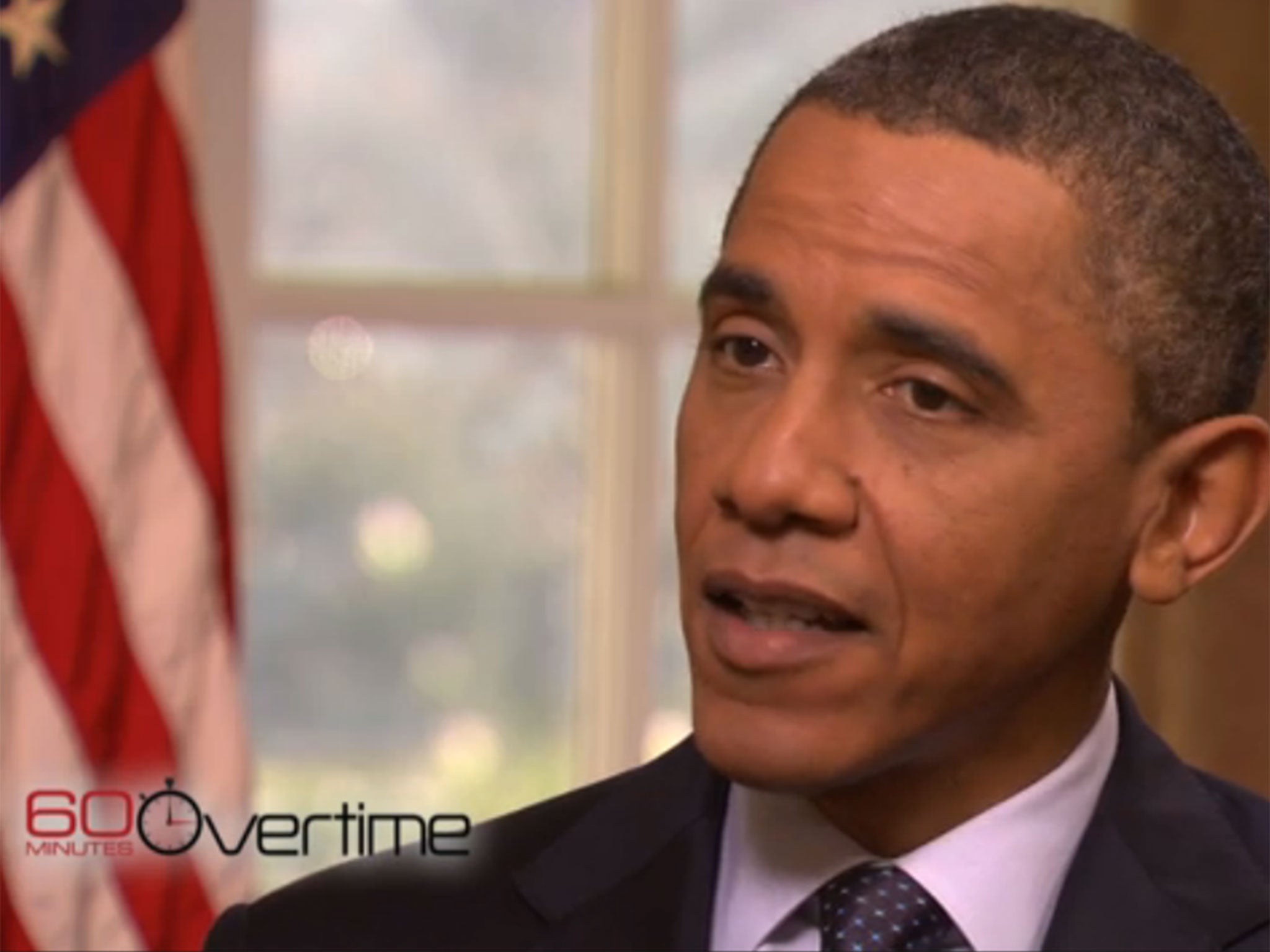US 'dropped the ball' on Isis threat, says Barack Obama
President says disparate militant groups were able to 'reconstitute themselves and take advantage of chaos' during Syrian civil war

Your support helps us to tell the story
From reproductive rights to climate change to Big Tech, The Independent is on the ground when the story is developing. Whether it's investigating the financials of Elon Musk's pro-Trump PAC or producing our latest documentary, 'The A Word', which shines a light on the American women fighting for reproductive rights, we know how important it is to parse out the facts from the messaging.
At such a critical moment in US history, we need reporters on the ground. Your donation allows us to keep sending journalists to speak to both sides of the story.
The Independent is trusted by Americans across the entire political spectrum. And unlike many other quality news outlets, we choose not to lock Americans out of our reporting and analysis with paywalls. We believe quality journalism should be available to everyone, paid for by those who can afford it.
Your support makes all the difference.President Barack Obama has for the first time acknowledged that the US “dropped the ball” in assessing the threat posed by Isis in Iraq and Syria and put too much stock in the ability of Iraqi government forces to stop them.
Mr Obama placed the blame for the misreading of the strength of Isis, which now controls parts of Iraq and Syria, on the US intelligence community and James Clappper, the US director of national intelligence. Mr Clapper, “has acknowledged, I think, they underestimated what had been taking place in Syria,” he said.
Islamic militants went underground when US Marines quashed al-Qaeda in Iraq with help from Iraq's tribes, he said.
“But over the past couple of years, during the chaos of the Syrian civil war, where essentially you have huge swaths of the country that are completely ungoverned, they were able to reconstitute themselves and take advantage of that chaos,” Obama said.
“And so this became ground zero for jihadists around the world.”
Speaking to CBS News, Mr Obama was hopeful about the campaign against Isis in Iraq, which Britain has now formally joined, underscoring the importance of the new government there under Prime Minister Haider al-Abadi. “We’ve got a campaign plan that has a strong chance for success in Iraq,” he said. He was notably less certain about a parallel campaign, launched last week by the United States in conjunction with some Arab allies to root out Isis, in Syria.
He also agreed there was a conundrum in Syria because going after the fighters of Isis could end help President Bashar al-Assad. But tackling Isis had to take priority.
“I recognise the contradiction in a contradictory land and a contradictory circumstance,” he said, but added, “We are not going to stabilise Syria under the rule of Assad,” who has committed “terrible atrocities”.
While Mr Obama has repeatedly asserted that there will be no American, “boots on the ground”, a NBC/Wall Street Journal poll yesterday showed that most Americans do not believe him.
More than two thirds said the United States would end up sending ground troops and 45 per cent said they would support it.
Obama last week expanded US-led air strikes, which began in Iraq in August, to Syria and he has been seeking to build a wider coalition effort to weaken Isis (also known as Islamic State). The group has killed thousands and beheaded at least three Westerners while seizing parts of Syria and northwestern Iraq.
Clapper told a Washington Post columnist this month that US intelligence had underestimated Isis and overestimated Iraq's army.
“I didn't see the collapse of the Iraqi security force in the north coming,” Clapper was quoted as saying. “I didn't see that. It boils down to predicting the will to fight, which is an imponderable.”
Obama outlined the military goal against Isis: “We just have to push them back, and shrink their space, and go after their command and control, and their capacity, and their weapons, and their fueling, and cut off their financing, and work to eliminate the flow of foreign fighters.”
But Obama said a political solution was necessary in both Iraq and Syria for peace in the long term.
“I think there's going to be a generational challenge. I don't think that this is something that's going to happen overnight,” Obama said, citing an environment in which young men “are more concerned whether they're Shia or Sunni, rather than whether they are getting a good education” or a good job.
Saying a solution involved “how these countries teach their youth,” Obama said: “What our military operations can do is to just check and roll back these (militant) networks as they appear and make sure that the time and space is provided for a new way of doing things to begin to take root.”
Obama said he recognized the contradiction in opposing the rule of Syrian President Bashar al-Assad while battling Islamic State militants who have been fighting Assad's government.
“For Syria to remain unified, it is not possible that Assad presides over that entire process,” Obama said. “On the other hand, in terms of immediate threats to the United States, Isil, Khorasan Group, those folks could kill Americans.”
Asked about how despite assembling a large international coalition against Islamic State, it appeared the United States was doing most of the work, Obama replied: “That's always the case.
“America leads,” he said. “We have capacity no one else has. Our military is the best in the history of the world. And when trouble comes up anywhere in the world, they don't call Beijing. They don't call Moscow. They call us.”
Additional reporting by Reuters
Join our commenting forum
Join thought-provoking conversations, follow other Independent readers and see their replies
Comments